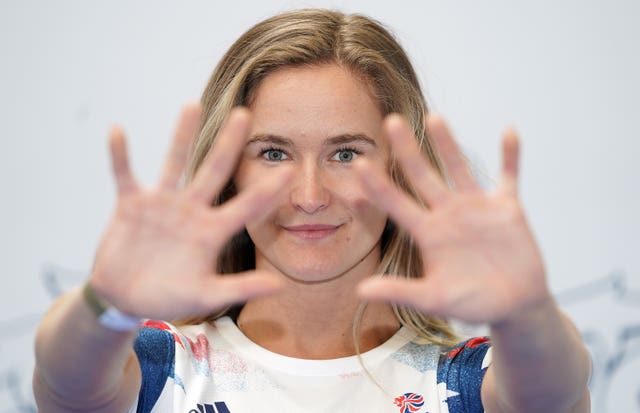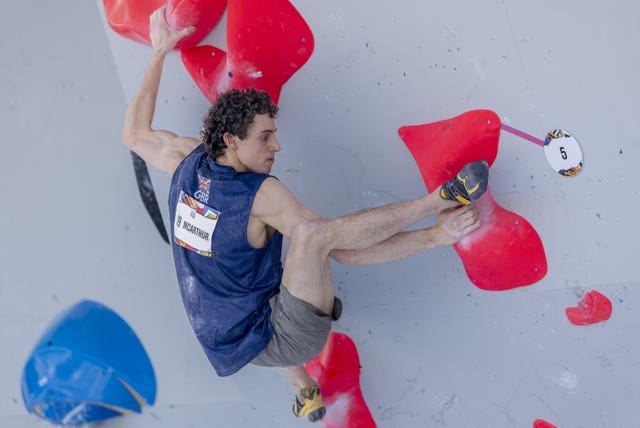Just over four hundred miles separate Caley Crags in Wharfedale from the Le Bourget Climbing Centre in the teeming Paris suburb of Saint-Denis, but it might as well be a world away for the York-born Team GB hopeful Hamish McArthur.
For McArthur, who admits his perfect day comprises the solitude of a solo climb on the cliffs closest to his home, the prospect of pitting his wits against rivals amid the glare of a global television audience is one that does not come naturally.
While the 23-year-old, one of a four-strong British climbing team for the Paris Olympics, is eager to grasp a rare opportunity to project the sport he loves on the world stage, he has also made sure to plot plenty of post-Paris escape routes.
“I’m going to be heading for a forest immediately afterwards,” McArthur told the PA news agency. “There are things around the Olympics, the ceremonial aspect and the excess, which I don’t love.
“It makes it feel serious when essentially it should just be a game. We’re just playing around really. From the outside, it’s quite a ridiculous thing to be passionate about – we are trying to climb these artificial rocks and everyone is getting stressed out of their mind like their lives depend on it – me too at times.
“But I understand that this is an opportunity to share a message, to inspire people to start climbing for the right reasons, and that being in this position allows me to be a full-time climber. So there is a balance to be struck.”
McArthur took to climbing at an early age, becoming the youngest member of the junior GB squad at the age of 11, and made his competitive breakthrough with a bronze medal at his first senior world championships in 2021 – the same year in which he “flashed” the notoriously tough Bulbhaul climb at Almscliffe Crag – climbing-speak for accomplishing it at the first attempt.
Climbing’s elevation to Olympic status for the delayed 2020 Tokyo Games changed the landscape for athletes like McArthur, who suddenly had access to funding and more sponsorship opportunities, and was increasingly obliged to balance two markedly different aspects of his sport.

“In the last few years I’ve absolutely loved competing – I don’t want to give off the impression that it’s just something I do because I’ve had to,” added McArthur.
“I’ve taken a lot of joy from it, it’s given my family and friends a lot of joy too, and it’s taken me to a place where I’m able to explore a lot more, bigger picture things.
“But I feel like I’ve got to guard against the allure (of competitive climbing). Obviously I am setting this example of being a high-performance athlete, but that’s not what climbing is about at its core.”
Following criticism in Tokyo, the sport climbing programme has been split into two different disciplines, with the head-to-head speed category separated from a combined boulder and lead event, in which McArthur and his GB team-mates compete.

Bouldering comprises a quest to scale a 4.5 metre-high wall without ropes in as few attempts as possible, while lead requires athletes to pit their wits against a 15 metre wall, sight unseen, which becomes steadily more complex throughout the event.
And while McArthur is eager to make history as Team GB’s first Olympic climbing medallist, it will not take long for his mind to stray to prospective future exploits outdoors.
Rather than hundred-metre sprinters or swimming stars, McArthur grew up idolising the American climber Chris Sharma, and professes his great ambition is to emulate his idol’s 2005 ascent of the previously unconquered ‘Dreamcatcher’ crag in British Columbia.
“It’s one of the first climbing videos I got really psyched on, and it just inspired me so much,” continued McArthur.
“It’s been in the back of mind for ever to go there and try to flash that climb.
“Essentially, I’d like to be a dirtbag with a steady financial income for a period of time, where I can just go off and explore things by myself, because I’ve never done that.
“It’s quite difficult to manage climbing outside with competition, because you put yourself at much more risk of little injuries. But climbing outside, hanging out with people, without having to think of the consequences or how it affects training or competition – that’s the dream.”

